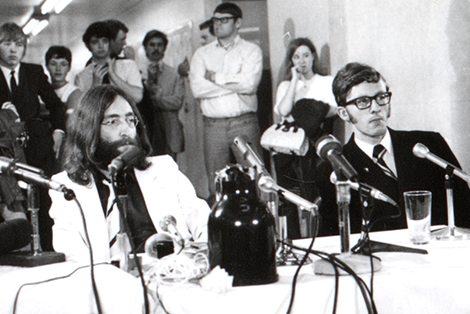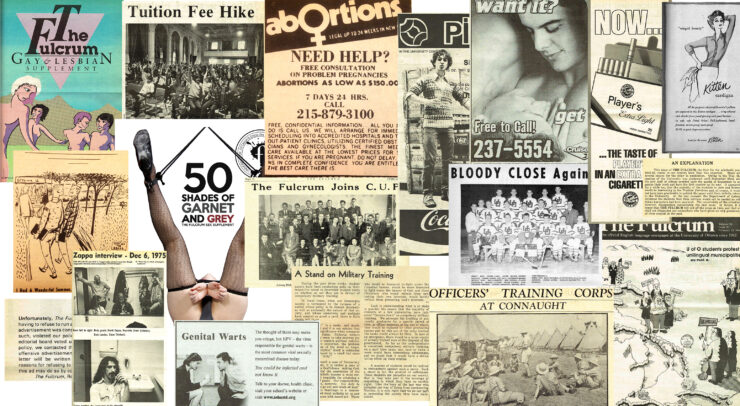University says it has no plans to implement such a rulebook
This article was originally published on Nov. 6, 2014
The Student Federation of the University of Ottawa (SFUO) has prepared a new campaign in response to rumours that the University of Ottawa may introduce a code of conduct.
Rallying under the hashtag #DefytheCode, a play on the university’s new “defy the conventional” rebranding campaign, students are hoping to raise awareness about the possibility of a code of conduct and what it would mean for students.
A code of conduct could place regulations on student behaviour both on- and off-campus.
“I think the issue is here is where do we draw the line with the code of conduct?” said Chris Hynes, the SFUO’s vice-president of university affairs.
“It impacts everything that you do, even if you’re not on campus,” he said. The SFUO is also worried that the code could be used to censor students.
Rumours surfaced in the wake of two incidents that occurred last winter: a sexually graphic Facebook group chat about SFUO president Anne-Marie Roy was posted online, and a few days later, members of the men’s hockey team were accused of sexually assaulting a young woman in Thunder Bay while in town for a game.
In response, the university administration created a taskforce on respect and equality to combat sexualized violence on campus.
At a press conference in June, University of Ottawa president Allan Rock, said the university would implement guidelines for coach and athlete behaviour.
The U of O denied any intention of implementing a code of conduct in a statement, however they are awaiting a report from the taskforce that could recommend the implementation of a standard of conduct.
“It’s come to our knowledge that the taskforce has considered a code of conduct and has had discussions about it,” said Hynes.
“We should all have a standard of behavior, we should all act like decent human beings,” he said. “But what right does the university have to impact students’ academic careers when the majority of society is already controlled by the law?”
The fact that the U of O does not have some sort of non-academic code of conduct is actually more of a rarity among Canadian universities. These sorts of documents exist at York, McGill, the University of British Columbia, Queen’s, the University of Toronto, Carleton, and more.
In 2011, two students at McGill were accused of violating their school’s code of conduct while demonstrating in solidarity with striking support staff workers. Joël Pedneault and Micha Stettin were accused of causing a traffic disturbance which violated the university’s code.
“This was not an individual attack on (Pedneault or myself),” Stettin said then, according to the Charlatan. “It was an attack on activism… an attack on freedom of assembly, an attack on dissent.”
In some cases, individual faculties will have their own specific behavioural guides, such as the Telfer School of Management.
The U of O previously met vehement student opposition when it proposed a non-academic code of conduct in April 2008.
Mireille Gervais, director of the SFUO-affiliated Student Rights Centre (SRC) was one of the loudest voices during the 2008 protests.
“The threat of punishment doesn’t change our culture, it simply adds a mechanism for control over students by the administration,” said Gervais. “That is not fostering a campus where there is freedom, debate, free expression, and student action in all spheres of your political views.”
The Revolutionary Student Movement (RSM) hopes to call a student strike at next month’s general assembly, partially to voice opposition to a code of conduct.
Fun facts about this article
- In Charley Dutil’s Oct. 2021 article about the Human Rights Office’s framework for a policy outlining students’ rights and responsibilities, Tim Gulliver, the University of Ottawa Students’ Union’s president refers to the events of the 2014-15 Code of conduct saga;
- Spencer Murdock is now a sports liaison officer with the U of O’s varsity athletics departement;
- Anne-Marie Roy is now the communication officer for the Association of Professors of the University of Ottawa
- No code of conduct was passed in 2014-15;
- The UOSU is now the union representing undergraduate students at the U of O;
- Allan Rock was Jacques Frémont’s predecessor, he is most famous for convincing John Lennon and Yoko Ono to “attend a forum on world peace in Ottawa — essentially a press conference held on campus in the lobby of Simard Hall.”






